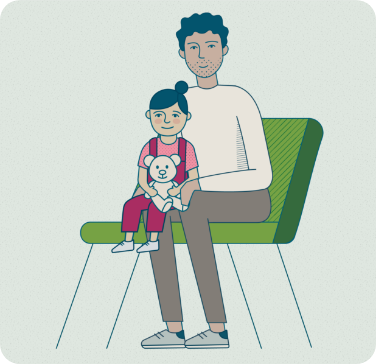This site is intended for parents/carers of children who may display an unusual/atypical motor and/or cognitive development (or the lack of). The intent of this website is not to make a diagnosis but to encourage the parents/carers to promptly seek medical advice and/or referral to a relevant specialist.
Most observations turn out to be harmless or have a cause other than rare/developmental disorders. Nevertheless, you should take action if you notice any unusual signs in your child’s development, by discussing them with your healthcare provider. Early detection increases the chances for early intervention and outcomes for your child.
On this page you can find information on visiting your healthcare provider, visiting a paediatrician/specialist, some questions you may want to ask to facilitate the conversations with them, and what to do in between your appointments.
If you suspect any developmental anomalies in your child, book an appointment with your healthcare provider promptly.
During the consultation with your healthcare provider, you should express the aspects of your child’s development you are most concerned about, giving specific examples of atypical developmental patterns you have observed. For instance, you may explain that your child doesn’t seem able or struggles to perform some tasks they previously learned or mastered.
Your healthcare provider may perform some tests and examine your child, which may involve trying to mimic the signs you reported. These may include, but are not limited to:

Your healthcare provider may require for further tests or analyses to be performed to obtain a clearer picture of your child’s health, ruling out some suspected infections or illness.
If your healthcare provider feels your child’s symptoms require additional monitoring or assessment, they may ask for you to return for a follow-up appointment, or refer you to a specialist. If you notice any further changes between appointments, bring these to your healthcare provider’s attention immediately.
If your healthcare provider determines your child requires further assessment, they may refer them to to see a specialist or paediatrician – a doctor who specialises in looking after children. These specialists have more experience and knowledge specific to some aspects of your child’s development.
The first appointment with the specialist usually lasts up to an hour. Some of the tests conducted by your healthcare provider may be repeated, and they may ask questions relating to your child’s health, past medical history, your family and their health.
During this or a following appointment, your child’s development may also be assessed further. This may be interactive, with your child tasked to engage with toys or games. Most are fun, and the doctor might ask for your help in encouraging them, or keeping your child focused and calm. It is important that you allow the doctor to assess your child independently, without any involvement from yourself, unless requested, as this could affect the outcome of the assessments.
The specialist/paediatrician will discuss with you the concerns you have and provide you with feedback and advice based on their observations. They will agree a plan with you and offer recommendations, where needed. The next steps may include the following:

It is important that you play a proactive role in managing your child’s developmental concerns. Take notes, share your observations, and ask questions.
Here are some questions you may want to ask your healthcare provider to facilitate the conversation:

Please remember: Finding out what could be causing your child’s developmental concerns could take some time. Keep attending appointments and bring any new signs or concerns to the attention of your healthcare professional immediately.
There may be some time in between appointments with your healthcare professional and seeing specialists/paediatricians, but it is important to continue to be proactive. Here are some suggestions of what to do in between appointments:

Track your child’s development with an easy to use, illustrated milestone digital diary. This digital diary can be used to document your child’s development and can be a valuable tool to guide conversations with your healthcare provider. It can provide evidence and examples that will help them make informed decisions about the most appropriate care for your child and potentially speed up referrals where needed.
IE-NoP-2500031 I DOP: May 2025